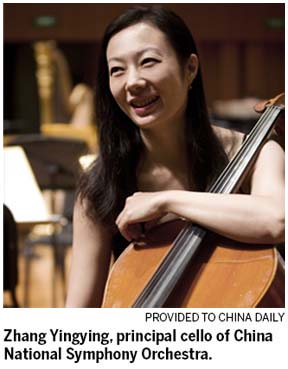
The Forbidden City Concert Hall's summer festival Opening Door of the Arts that starts on Friday has a lot on its plate.
There are no big stars, no renowned orchestras, but the month-long festival offers basic programs from Baroque to modern pieces, from recital to chamber and chorus, and from tango to Chinese folk music.
"It seems a trend for festivals or venues to present the world's top orchestras or great conductors to play Beethoven or Tchaikovsky's big symphonies," says Zhang Yingying, principal cello of China National Symphony Orchestra, who will give a recital on July 10.
"It's good but I believe regular concert-goers who really understand the music are just a small part. We need simple educational programs for beginners and we need variety."
That's why she has repeatedly given recitals or small chamber concerts at Peking University since 2009 and that's why she has joined this year's Opening Door of the Arts.
She usually gives a pre-concert talk about the program, the cello, or answers any interesting questions about classical music raised by audiences.

"The intimate atmosphere and the audience's reaction is great feedback for performers. I can feel their appreciation for the music and for my performances," says the 40-year-old cellist.
"It's unnecessary to pay a big sum of money for a 'luxury' concert. Some people can enjoy that and can afford it, but ordinary people also need normal concerts too," she says and notes the reasonable ticket price of less than 100 yuan ($15.80) for Opening Door of the Arts.
This time at the Forbidden City Concert Hall, Zhang will play Saint-Saens' The Swan, Bach's Little Suite No 2 Aria, Tchaikovsky's Nocturne, and Beethoven's Seven Variation based on Mozart's Magic Flute.
Zhang also invites her friend and pianist Ren Shuman to play some pieces, and there will also be a host to introduce every piece.
Born to a cellist mother and a folk musician father in Beijing, in 1972, Zhang started to learn cello at almost 7. It was not an early age like today's prodigies, but the "culture revolution" (1966-76) had just ended and music had returned to the family, which could afford a small-sized cello.
The 21-year-old Zhang was champion at the national cello competition in 1993 and graduated from Central Conservatory of Music in 1995. Then she joined National Symphony of China and soon rose to become one of the best cellists of her generation, in the country.
In 1999, she went to University of Southern California to further her studies with renowned woman cellist Eleonore Schoenfeld (1920-2007) and received a master's degree there. Between 2001 and 2004, she served as the principal cellist at the La Sierra University Symphony Orchestra at the Riverside, in the US. After that, she toured widely in US and Europe as a soloist.
Zhang returned to the National Symphony of China in 2007 and formed a string quartet with three other players from the orchestra to give regular chamber concerts throughout China.
Chenjie@chinadaily.com.cn?